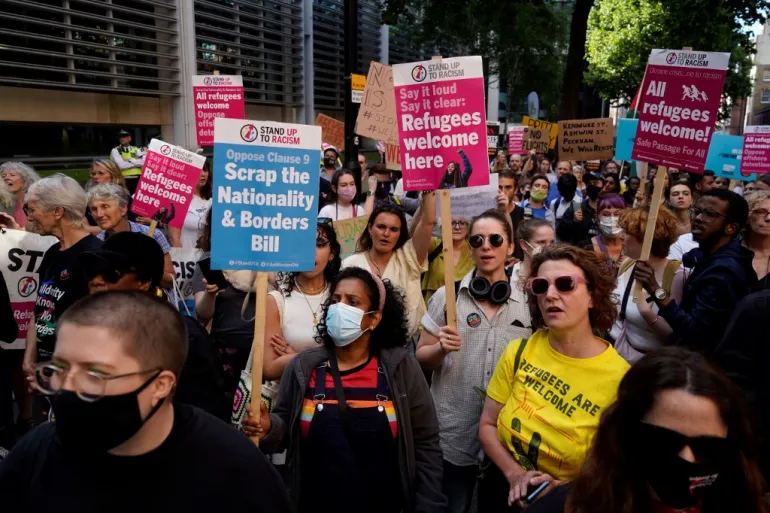Africa in Focus: Nigeria fines Meta $220m, sets Binance tax case; US invites Sudanese talks; UK plans £10bn Rwanda deportation
Nigeria has levied a substantial fine of $220 million against Meta Platforms, as revealed by an announcement from the country’s competition watchdog on Friday. This punitive measure is the result of extensive investigations that uncovered significant violations of local consumer protection, data protection, and privacy laws due to Meta’s data-sharing practices on its social platforms.
The Federal Competition and Consumer Protection Commission (FCCPC) of Nigeria has indicated that Meta engaged in the unauthorized appropriation of Nigerian users’ data across its platforms. Furthermore, the FCCPC accused Meta of abusing its dominant market position by imposing exploitative privacy policies on users, policies that were deemed particularly harsh and discriminatory towards Nigerians compared to other regions with similar regulatory frameworks.

Meta has yet to provide an official response to the fine. However, the FCCPC noted that the company had submitted various documents and engaged legal counsel, who have been actively communicating and negotiating with the agency. This interaction suggests an ongoing dialogue between Meta and Nigerian authorities, possibly indicating the company’s efforts to mitigate the impact of the fine or negotiate terms of compliance.
Detailed Investigations
FCCPC Chief Adamu Abdullahi provided insights into the thoroughness of the investigation, which was a joint effort with Nigeria’s Data Protection Commission and spanned over an extensive period of 38 months. The lengthy duration of this investigation underscores the complexity and severity of the issues at hand, reflecting a diligent and meticulous process undertaken by Nigerian authorities to ensure that all aspects of Meta’s operations were scrutinized.
The investigations concluded that Meta’s policies systematically failed to provide users with the autonomy to self-determine or withhold consent regarding the collection, usage, and sharing of their personal data. Abdullahi highlighted that this lack of user choice was a critical factor in the violations, emphasizing the importance of user consent in data protection frameworks.
Continuing and Repeated Infringements
“The comprehensive investigation has led to the conclusion that Meta has engaged in conduct over an extended period that constituted multiple, repeated, and ongoing infringements. These violations are particularly notable for their abusive and invasive nature against data subjects in Nigeria,” Abdullahi remarked. This statement underscores the persistent and egregious nature of Meta’s actions, which were not isolated incidents but part of a broader pattern of behavior that systematically undermined user rights and privacy.
Abdullahi further elaborated that, “With substantial evidence amassed during the investigation and considering that Meta has been given every opportunity to present any positions, representations, refutations, explanations, or defenses of their conduct, the Commission has now issued a final order and imposed a significant penalty against Meta.” This final order signifies the culmination of a thorough investigative and judicial process, affirming that Meta was given ample opportunity to defend its actions but ultimately found wanting in its adherence to legal and ethical standards.
The final order mandates specific steps and actions that Meta must take to align with local laws. These measures are designed to rectify the violations and ensure that Meta’s operations in Nigeria comply with established legal standards moving forward. This aspect of the ruling highlights the proactive stance of Nigerian authorities in not only penalizing past infractions but also in setting a clear framework for future compliance.
Global Context and Related Developments
The fine imposed on Meta in Nigeria is part of a broader pattern of regulatory pushback that the company has faced globally. In May, Turkey’s competition board imposed a fine of 1.2 billion lira on Meta following similar investigations into data-sharing practices on its Facebook, Instagram, Threads, and WhatsApp platforms. This indicates a growing international consensus on the need to hold major tech companies accountable for their data protection practices.
In Europe, Meta has encountered significant resistance over alleged breaches of data protection laws, particularly concerning its plans to use personal data to train artificial intelligence models without obtaining explicit user consent. These plans have come under intense scrutiny, reflecting broader concerns about privacy and data security in the era of AI and big data.
Meanwhile, South Africa’s competition watchdog has announced plans to investigate whether digital platforms, including Meta, are engaging in unfair competition with news publishers by using their content to generate advertising revenue. This investigation is part of a wider examination of the balance of power between digital platforms and traditional media, highlighting concerns about the economic and ethical implications of content usage and revenue generation in the digital age.
Conclusion
The $220 million fine imposed by Nigeria on Meta Platforms represents a significant regulatory action aimed at curbing the misuse of personal data and reinforcing the importance of consumer protection. This case highlights the growing determination of national authorities to ensure that global tech giants adhere to local laws and respect user privacy and data rights. The ongoing global scrutiny of Meta’s practices underscores the broader challenges and responsibilities facing tech companies as they navigate complex regulatory landscapes and evolving expectations around data protection and privacy.
UK Home Minister announces £10bn plan for Rwanda deportation scheme
In a significant policy reversal, Britain’s previous government had earmarked £10 billion ($12.9 billion) for a controversial plan to deport asylum seekers to Rwanda, a scheme that has now been abandoned. New Home Secretary Yvette Cooper revealed that this plan has already burdened British taxpayers with a staggering cost of £700 million ($830.7 million).
Prime Minister Keir Starmer’s Labour government decisively scrapped the deportation initiative in its first major policy announcement after securing a sweeping election victory this month. Cooper explained that the incurred costs covered a range of expenditures, including chartering flights that never departed, remunerations for government officials’ efforts, and a hefty £290 million ($344 million) payment to the Rwandan government.

Unprecedented Waste of Taxpayer Money
“This is the most shocking waste of taxpayers’ money that I have ever seen,” Cooper declared in a parliamentary session, emphasizing the inefficiency and mismanagement of public funds under the previous administration.
Conversely, James Cleverly, the Conservative home affairs spokesman who advocated for the plan during his tenure as home secretary, challenged Cooper’s assertions, accusing her of presenting “made-up numbers” and criticizing the Labour Party’s perceived disrespect towards the Rwandan government.
Legal and Ethical Challenges
In a critical ruling in November, the United Kingdom Supreme Court deemed the deportation program illegal under international law, citing that Rwanda could not be considered a safe destination for asylum seekers. This ruling effectively nullified the policy, which had been initially announced in 2022 by the Conservative government as a measure to deter asylum seekers from arriving in Britain on small boats.
Despite the bold claims and intentions, legal battles ensured that the plan never came to fruition, with no asylum seekers being deported to Rwanda except for four individuals who opted to go under a voluntary scheme. Starmer’s administration has pronounced the scheme “dead and buried” on his first full day in office, reinforcing the termination of the controversial policy. Nevertheless, Rwanda has indicated that it has no obligation to return the funds already received from Britain.
Future of Asylum Seekers in Limbo
Cooper further assured that tens of thousands of asylum seekers, previously left in uncertainty due to the threatened deportation to Rwanda, would now have their asylum claims processed. This move aims to bring clarity and justice to those whose lives have been destabilized by the now-defunct policy.
Global Humanitarian Crises
In a broader context of global humanitarian challenges, nearly 9 million people have been displaced, with over 1 million fleeing their countries, as reported by the United Nations. Thousands have perished in conflicts that have not received as much international attention as the crises in Gaza and Ukraine. The recent aid initiatives are part of a concerted effort to address these pressing issues.
U.S. Ambassador to the United Nations, Linda Thomas-Greenfield, highlighted the critical need for global action, announcing new funding to support refugees. “We hope this new round of aid serves as a call to action for others to follow. Partners will use this funding to build new shelters for refugees, provide cash assistance for rent, and help children return to school,” she stated, outlining the multifaceted approach to humanitarian aid.
Sudan’s Humanitarian Crisis
Thomas-Greenfield also drew attention to the dire situation in Sudan, where the war that began over a year ago has forced tens of thousands to seek refuge in neighboring Chad. The U.N. has called for $2.7 billion in funding to address humanitarian needs in Sudan but has received only $155 million, representing a mere 6% of the required amount.
“My call is for those who have influence over the warring parties to press them to come to the table. Until they do, the people of Sudan will continue to suffer. There is no military solution to this situation,” Thomas-Greenfield emphasized, underscoring the urgent need for diplomatic resolution to alleviate the suffering of millions affected by the conflict.
Conclusion
The scrapping of Britain’s Rwanda deportation plan marks a significant policy shift and highlights the ongoing debate over asylum and immigration policies. The immense financial costs and legal challenges associated with the plan underscore the complexities and ethical considerations inherent in such policies. Simultaneously, global humanitarian crises continue to demand attention and action, as exemplified by the situations in Sudan and other conflict zones, necessitating a collaborative international response to address the suffering and displacement of millions.
US invites Sudan conflict parties to Switzerland for talks
In a concerted effort to halt the devastating conflict in Sudan, the United States has extended formal invitations to both the Sudanese army and the Rapid Support Forces (RSF) for US-mediated ceasefire talks. These critical discussions are scheduled to commence on August 14 in Switzerland. The aim is to bring an end to the violence that has ravaged the nation since April 2023, causing immense human suffering and widespread displacement.

The Scope and Purpose of the Talks
US Secretary of State Antony Blinken outlined the comprehensive objectives of these talks in a detailed statement. The discussions will not only include representatives from the Sudanese military factions but will also involve regional stakeholders and key international organizations. The primary goals are manifold: to achieve a comprehensive cessation of violence across Sudan, ensure the swift and effective delivery of humanitarian aid to those in desperate need, and establish a robust monitoring and verification mechanism to guarantee the implementation of any agreements reached.
“The scale of death, suffering, and destruction in Sudan is devastating. This senseless conflict must end. The Sudanese Armed Forces and the Rapid Support Forces must attend the talks and engage constructively,” Blinken emphasized, underscoring the urgent necessity for both parties to participate in good faith and work towards a peaceful resolution.
A Context of Continuing Violence and Humanitarian Crisis
Since the conflict erupted in April 2023, Sudan has been plunged into chaos. The violent clashes between the army and the RSF have resulted in the deaths of tens of thousands of people and forced millions to flee their homes. The displacement crisis has not only affected those within Sudan but has also pushed countless individuals across the nation’s borders into neighboring countries, exacerbating regional instability.
The relentless violence has decimated Sudan’s healthcare system and infrastructure. Hospitals and clinics have been destroyed or rendered inoperative, leaving millions without access to essential medical services. The country is teetering on the brink of famine, with food shortages becoming increasingly severe. The humanitarian crisis has reached a critical point, with millions of civilians caught in the crossfire and struggling to survive without basic necessities such as food, clean water, and shelter.
The Legacy of the Jeddah Talks
Matthew Miller, the spokesperson for the US State Department, provided further insights into the strategic aims of the upcoming Switzerland talks. He explained that these discussions are intended to build upon the progress made during the earlier negotiations held in Jeddah, Saudi Arabia. The Jeddah talks, despite their significance, failed to secure a lasting ceasefire. However, they laid important groundwork by bringing the conflicting parties to the negotiating table and highlighting the urgent need for a peaceful resolution.
“The Switzerland talks aim to bring both sides back to the negotiation table, build on the progress made during the Jeddah talks, and transition the discussions to the next phase,” Miller said. This phase is expected to focus on more concrete measures for achieving a ceasefire and addressing the immediate humanitarian needs of the affected populations.
The International Community’s Response
The international community has been vocal in its condemnation of the ongoing violence in Sudan and has called for immediate action to address the escalating humanitarian crisis. Numerous international organizations, including the United Nations and various non-governmental organizations, have been actively involved in providing aid and support to those affected by the conflict. However, the scale of the crisis requires a coordinated and sustained effort to ensure that aid reaches all those in need.
Secretary Blinken’s Statement on the Humanitarian Situation
In his statement, Secretary Blinken painted a grim picture of the current situation in Sudan, emphasizing the urgency of the need for peace. “The scale of death, suffering, and destruction in Sudan is devastating. This senseless conflict must end,” he said. Blinken stressed the importance of the Sudanese Armed Forces and the Rapid Support Forces attending the talks and engaging constructively. “The Sudanese Armed Forces and the Rapid Support Forces must attend the talks and engage constructively,” he reiterated, highlighting the necessity for both parties to commit to the peace process.
The Humanitarian Crisis: A Closer Look
The humanitarian crisis in Sudan is one of the worst in the world today. The conflict has caused a catastrophic breakdown in essential services and infrastructure. Hospitals and clinics have been targeted or caught in the crossfire, leading to a severe shortage of medical supplies and personnel. This has left millions of people without access to critical healthcare services, exacerbating the spread of disease and increasing mortality rates.
The destruction of infrastructure has also disrupted the supply of food and clean water. Many regions are facing acute food shortages, with the country on the brink of famine. The United Nations has warned that millions of people are at risk of starvation if immediate action is not taken. The lack of clean water has led to outbreaks of waterborne diseases, further compounding the humanitarian crisis.
The Impact on Displaced Populations
The conflict has forced millions of people to flee their homes, creating a massive displacement crisis. According to the United Nations, millions of Sudanese have been internally displaced, while countless others have sought refuge in neighboring countries. The refugee camps in these countries are overwhelmed, struggling to provide basic services and support to the influx of people.
The displaced populations face numerous challenges, including lack of access to food, clean water, and healthcare. The conditions in the camps are often dire, with inadequate shelter and sanitation facilities. This has led to outbreaks of disease and increased vulnerability among the displaced, particularly women, children, and the elderly.
The Role of International Aid and the Need for a Ceasefire
The international community has responded with humanitarian aid, but the scale of the crisis requires a more coordinated and sustained effort. Aid organizations are working tirelessly to provide food, water, shelter, and medical care to those affected by the conflict. However, the ongoing violence has made it difficult to reach many areas in need.
The ceasefire talks in Switzerland are crucial for creating a safe environment for the delivery of humanitarian aid. A cessation of hostilities would allow aid organizations to operate more effectively and reach the most vulnerable populations. Establishing a robust monitoring and verification mechanism is essential to ensure that any ceasefire agreement is upheld and that aid reaches those in need.
The Path Forward: Building Sustainable Peace
The upcoming talks in Switzerland represent a pivotal moment for Sudan. They offer a chance to halt the violence and address the humanitarian catastrophe that has gripped the nation. The inclusion of regional stakeholders and international organizations in the discussions is expected to provide a broader perspective and additional support for the peace process.
By fostering a collaborative environment, the US-mediated talks aim to pave the way for a ceasefire and ensure that humanitarian aid reaches those most in need. Establishing a monitoring and verification mechanism is crucial to maintaining the integrity of any agreements and holding both sides accountable.
Conclusion
The ceasefire talks in Switzerland are a significant step towards ending the conflict in Sudan. The international community’s support and involvement are essential in facilitating a peaceful resolution and addressing the humanitarian crisis. As both sides prepare to engage in these critical discussions, there is hope that a comprehensive and lasting peace can be achieved, bringing relief to the millions of Sudanese affected by the conflict.
The road ahead is challenging, but with the commitment of all parties involved, it is possible to bring an end to the violence and build a brighter future for Sudan. The world watches as the talks approach, with the hope that this moment will mark the beginning of a new chapter of peace and recovery for the beleaguered nation.
Nigerian Court Sets Trial Date for Binance Executives Over Tax Evasion Charges
A Nigerian court has announced it will begin the trial against cryptocurrency exchange Binance on tax evasion charges on October 11. The judge presiding over the case disclosed this development on Friday, marking a significant step in the legal proceedings against the company.

Charges and Defendants
The charges involve high-profile Binance executives, Tigran Gambaryan and Nadeem Anjarwalla, who face separate trials not only for tax evasion but also for money laundering. Tigran Gambaryan, a U.S. citizen and the head of financial crime compliance at Binance, was detained in Nigeria for over two months. On the other hand, Nadeem Anjarwalla, a British-Kenyan who serves as Binance’s regional manager for Africa, fled Nigeria in March.
Binance’s Response and Legal Strategy
Binance has firmly contested the allegations. The company’s legal representative, Teng, emphasized that the executives are challenging the charges brought against them. Teng provided insights into the timeline of events, revealing that the Binance executives initially engaged in discussions with Nigerian authorities in January. These discussions were followed by a significant meeting on February 26.
National Security Concerns and Demands
During the February 26 meeting, Nigerian authorities escalated the issue by labeling the concerns surrounding Binance as matters of national security. They made several demands, including the delisting of the naira, Nigeria’s currency, from Binance’s platform. Additionally, they requested comprehensive details on all Nigerian users registered with Binance.
Detention and Condemnation
The subsequent detention of Gambaryan and the flight of Anjarwalla have sparked significant controversy. Teng strongly condemned the detention of Binance’s executives following their cooperative meetings with Nigerian authorities, stating that such actions set a dangerous precedent for companies operating worldwide. He expressed concern that this could deter international businesses from engaging with local authorities, fearing similar punitive actions.
Broader Implications
The trial against Binance and its executives highlights the increasing scrutiny cryptocurrency exchanges face globally. As governments and regulatory bodies tighten their grip on the rapidly evolving crypto industry, companies like Binance are finding themselves in complex legal battles over compliance and regulatory adherence.
The Road Ahead
The upcoming trial on October 11 is poised to be a landmark case, potentially setting a precedent for how countries handle allegations of tax evasion and money laundering within the cryptocurrency industry. The outcomes could have far-reaching implications for the future operations of cryptocurrency exchanges in Nigeria and beyond.
Conclusion
As the trial date approaches, the global financial community will be closely monitoring the proceedings. The case underscores the critical need for clear regulatory frameworks and the importance of cooperation between cryptocurrency companies and national authorities. The resolution of this case will be pivotal in shaping the landscape of cryptocurrency regulation and compliance in the years to come.


